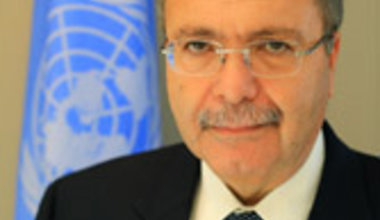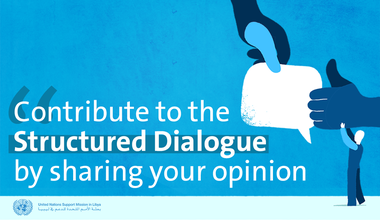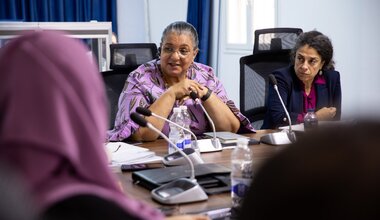Address by SRSG for Libya, Tarek Mitri, Conference on Human Rights in in Libya, Al-Baida 30 May 2013

I am pleased to join this session as you are about to conclude your conference on Human Rights in Libya. One cannot overemphasize that the United Nations Support Mission in Libya (UNSMIL) is greatly interested in your efforts and all similar endeavors; it is also keen to accompany attempts aiming at raising awareness in human rights protection and the consolidation of values on which human rights and its principles are based.
Security Council Resolution 2095, which extended the mandate of the Mission in March 2013, stipulates that it is the duty of the Mission to work in accordance with the Libyan national priorities. The issue of human rights has been one of those priorities since the start of the revolution. And within this context, it is also the duty of the Mission to support Libyan efforts aiming at the promotion of rule of law and human rights monitoring and protection, including those related to women and vulnerable groups, as well as ensuring humane treatment of detainees and enabling them access to due legal and judicial processes.
The Mission is also required to offer assistance to the competent Libyan authorities in the areas of judicial and correctional reform and rebuilding in a manner that ensures transparency and accountability, as well as development and implementation of a comprehensive transitional justice strategy, and advancement of national reconciliation.
In light of this mandate, and based on its responsibilities, UNSMIL, since its earliest days, has demonstrated its commitment to providing advice and assistance for a better documentation and more accurate knowledge of the extensive human rights violations, including killings, torture and forced disappearances that took place under the former despotic regime. UNSMIL is equally committed to assist in the development of an action plan that benefits from other experiences around the world at the levels of laws, tools and modalities, in order to address this heavy legacy - with all its ugliness and the harm that it has caused, and to bring justice to the victims. However, all of us are still taking first steps, for much serious and urgent work still awaits our Libyan friends, and we are with them in spite of the difficulties that may be encountered.
In conjunction with all this, one has to emphasize that human rights are pivotal to the building of the new Libya. This is what the Constitutional Declaration indicated, and this is what was expressed in various pronouncements of the Libyan revolution and through the positions of its leaders, in the diversity of their roles, ideological orientations and political tendencies.
Moreover, it seems to us that this emphasis enjoys a national consensus, which stems from a genuine and strong desire that the practices of the past are not repeated in any form, and that the new Libya is kept antithetical to the oppression and persecution that were inflicted on the Libyan people during the past decades of tyranny. It appears to us through the dialogue we have with various Libyan authorities and figures, that this national consensus is stronger than the threats of unacceptable practices, violations and seeing victims, in some cases, emulating their oppressors. The safeguarding and sustainability of this national consensus require that no justification is given for behaviors that contradict the values and aspirations of the revolution.
-1-
Furthermore, defending human rights should not be used as a weapon by one group against another, but should be a tool that enables all to fulfill the goals of their revolution in terms of putting an end to oppression, and committing to the requirements of national accord that are based on the foundation of common values. The preservation of human dignity, liberty and inalienable rights are at the heart of those values. The continued pursuit of building national consensus on human rights values and means through which those rights can be upheld and translated into laws and practices require moving beyond pure moral condemnation of violations or criminalization of those responsible for them, towards the fulfillment of justice, preventing revenge and ensuring respect of victims and their families.
I believe that you have discussed the human rights problems in Libya in a responsible, frank and serious manner. We stand with you, not only in diagnosing the well-known problems, but also in addressing them swiftly, without delay. We may have witnessed limited progress in certain areas, such as those of displaced persons, migrants and refugees, prisons and other detention facilities, as well as fair and expeditious judicial due processes. The call for more progress cannot wait, for deficient state capacities, institutional and human, should not be used as a pretext or a reason to maintain the conditions as they are. The empowerment of a nascent state is not the responsibility of government officials alone, but the responsibility of all, especially the dynamic forces in society. We stand with you in demanding speed – but not hastiness, in moving the legislative process forward, regarding especially transitional justice that puts an end to the impunity of those who committed crimes in the past, while paving the way for a genuine reconciliation that helps Libya heal its wounds and rebuild its national unity on new foundations.
While the legislative process is respectful of the classical democratic rule of resolving differences through voting, seeking consensus remains a desirable approach in light of Libya's current transition. Libya has witnessed polemics and divisions over some laws, one of which is the Political Isolation law; however, bridging the gap, which was a reason for and a result of, the issuance of the law, will not be impossible to achieve if some of the confusions are dispelled, and if criteria are scrutinized, fair and transparent implementation is monitored, and the right to appeal decisions before courts without discrimination or arbitrariness is assured. On the other hand, additional laws were enacted with little opposition, and by that I mean the Law on Criminalization of Torture and Forced Disappearance, and other laws do not seem to be the subject of much controversy, such as those related to victims of rape.
We in UNSMIL look forward with you to advance the enactment and application of laws related to the various issues that were raised during this conference. We are always ready to offer advice and technical assistance. We also look forward with you to take steady steps on the constitutional path in a manner that lays the foundation for a new social contract grounded in the agreement between Libyans on the meaning of their living together, national identity, basic human rights, those of individuals and groups, and drawing inspiration from their religious and cultural heritage.
I would like to express my gratitude and appreciation to those who convened this conference and to all who contributed to its deliberations. And I would like to acknowledge the invaluable contribution of those who work tirelessly for human rights. Please allow me to conclude by expressing my admiration to those who stood bravely and relentlessly in opposition to the dictatorial rule and who continue today defending and upholding human rights, and reaffirm their commitment to the safeguarding of human dignity in the name of the ethics of their revolution as well as their religious and humanist values.
May the peace of God be upon you,
 United Nations Peacekeeping
United Nations Peacekeeping UN
UN









